Investigative
Reporting
Award
Master and Chef
published by Proekt, The Daily Beast, Russia
An investigation into how Russia participates in the Libyan Civil War
Report jointly prepared with the Dossier Centre and The Daily Beast
“Master and Chef” is the fourth part in a series of four pieces by “Proyekt”
It appears from the correspondence between the envoys of the “Kremlin Cook”, Yevgeny Prigozhin, that there is a military contingent in Libya headed by the Deputy Commander of the Russian Airborne Forces, Andrei Kholzakov. “Proyekt” reports on the secret Russian operation to remodel this North African country.
This report contains strong language
“— So, you sl*t, you shot your gob off. You’ve really gone and disgraced yourself now. We’re going to be getting our own back on you, you traitor. Get ready.”
“Proyekt’s” correspondent received this threatening letter on August 29th. It’s signed with a pseudonym and was sent from an unknown address, registered with a free service; however, it arrived at the same time as the publication by the news agency FAN – which has links to businessman Yevgeny Prigozhin – of an investigation about links between “Proyekt” and the Russian opposition.
Twenty-four hours before that, correspondents from “Proyekt” contacted Prigozhin’s representative to ask him questions about Russia’s involvement in the Libyan civil war.
Arrest
In the early hours of the morning of May 17th, a couple of jeeps with armed men pulled up outside a private house in Tripoli. They crashed through the gates into the courtyard, broke into the building and then shoved two Russians who had been renting the house for a couple of months into cars and drove them away to an unknown destination. The Russians – Maxim Shugaley, a political strategist from St. Petersburg and Samer Suaifan, a medic/interpreter of Arab origin from Moscow and graduate of the PFUR (People’s Friendship University of Russia) – were both associates/employees of Prigozhin. The story of their arrest is reproduced according to the accounts of Aleksandr Malkevich and Aleksandr Prokofiev, both political strategists working with Prigozhin.
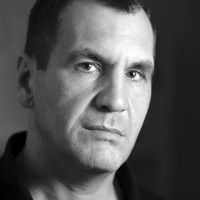
Maxim Shugaley
On 14 March, together with one other Russian – political strategist Aleksandr Prokofiev – they flew from Moscow to Istanbul, and then on to Libya. Two months into his mission Prokofiev flew out of Libya on leave – that’s how he avoided arrest.
Ever since then, the Russians have been hostages in Libya – they are under arrest in a prison near a Tripoli airport. The prison in question is controlled by the Agency Combatting Organised Crime (a structure officially reporting to the Ministry of Internal Affairs of the Libyan Government of National Accord – LAN), which is led by Abd ar-Rauf Kara – a warlord of one of the armed groups active in the Libyan capital – this information is contributed by political strategist Malkevich – chairman of the “Fund for the Protection of National Values”, an organisation set up in 2019 as an “umbrella” for activities carried out by Prigozhin’s specialists abroad; this is confirmed by numerous publications in foreign media. No official accusation has been levelled against them.
That was the finale of the unannounced intervention of Russia in the civil war which has been raging in Libya since 2014. The leak of documents from Prigozhin’s “back-office” (hereafter called the “Libyan file”) gives us now, for the first time, the opportunity of assessing the scale of this interference.
“Proyekt” has already reported on the work of the so-called “back-office” in St. Petersburg; it is precisely from there that all the work of Prigozhin’s people abroad is coordinated. Documents were received during 2019 from sources familiar with Prigozhin’s activity in Libya, and some of the facts related in the documents are confirmed in the words of other interlocutors, including Prigozhin’s staffers. The activity of the Russians working for Prigozhin mentioned in the documents (including the meta-data of the files) are confirmed by information in the public domain, by knowledge gained form social network accounts, and by the words of the sources themselves.
The editors do not publish documents in their entirety to protect the safety of the sources.
Russian assault
Almost nothing was known until that day about the presence of Russian troops in Libya, where a bloody civil conflict continues to rage unabated. In the years 2017 and 2018, Western and some Russian media (specifically, the British tabloid The Sun and the Russian press agency RBK), referring to anonymous sources, reported on units of Russian paratroopers being deployed to Libya. According to the journalists’ sources, they were helping the armed forces of Libya in the east of the country, fighting with the UN-recognised Government of National Accord in Tripoli (the latter of which was associated with the arrest of the Russians). However, this information was never confirmed by any documentary source, and the details of any possible presence of Russian military in North Africa was not known.
According to the correspondence of Prigozhin’s envoys in Libya, a “group of (Russian) Armed Forces” headed by Deputy Commander of the Airborne Forces, Andrei Kholzakov, was active in the country. In the mass of documents that the editorial board studied, Kholzakov was twice mentioned in that capacity. “Proyekt” forwarded questions about the activity of a Russian group under the command of Kholzakov to the press service of the Ministry of Defence but received no response. The 57 year-old Lieutenant General has extensive combat experience at home and abroad; he has served in Afghanistan and Chechnya and commanded the Russian military base in Gümri, Armenia. A representative of the Russian Paratroopers Union confirmed that Kholzakov is on mission in Libya, but refused to reveal the details of the mission, saying that such information is classified. The editors sent a request to the press service of the Airborne Forces, but at the time of publication, no reply had been received. Both the State Duma Defence Committee and the former Commander-in-Chief of the Airborne Forces, Vladimir Shamanov, declined to comment.
In one of the episodes which took place on April 4th, 2019, Prigozhin’s Libyan associates reported to Russia that the command of the national army of Field-Marshal Khalifa Haftar (see below) had requested the “commander of the group,” Kholzakov, to “deploy a squadron of UAVs (unmanned airborne vehicles) to locate the enemy’s artillery positions and to annihilate them. As seen from the report, Kholzakov refused the request.
The documents do not contain any evidence that Russian regular forces are currently taking part in military activity in Libya. However, there is mention of Russians assisting Haftar during an operation in Darnah: In 2018, Haftar’s army – possibly with help from the Russians – cleansed this eastern town of Islamists. RIA Novosti covered this operation, but without any reference to Russia’s role. It is possible that the Russians taking part in the operation in Darnah were not regular servicemen, but members of the private army affiliated to Prigozhin, which in the press is more commonly known as the “Wagner Group.” Previously, The Telegraph, referring to sources, had reported on the participation of Russian mercenaries in the events in Darnah.
Andrei Kholzakov
Deputy Commander of RF Airborne Forces (VDV), Lieutenant-General
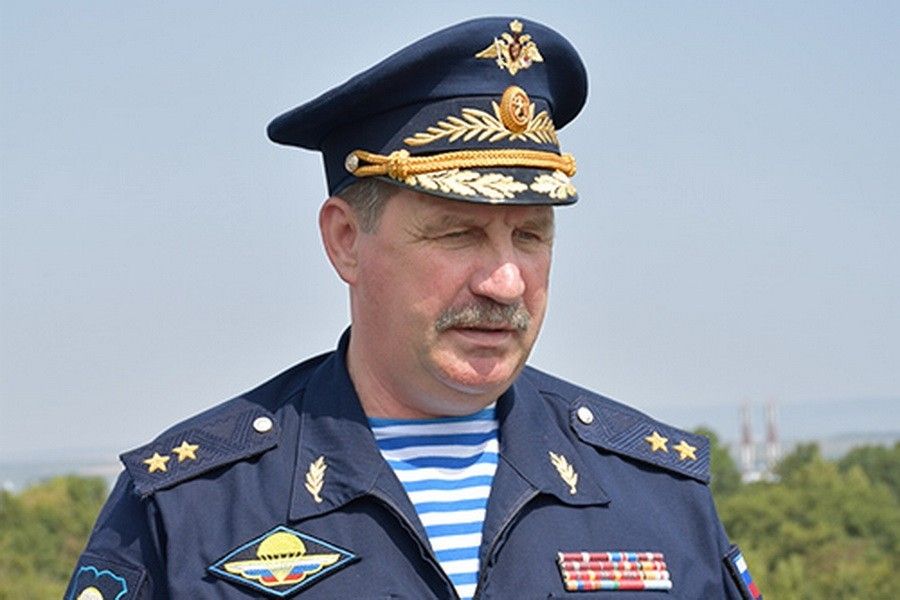
Andrei Kholzakov, Source: ruspekh.ru
According to his official biography, Kholzakov was twice deployed to Afghanistan, and took part in a counter-terrorist activities in the Northern Caucasus during the operation to close the Chechen border with Georgia in 1999. In 2013, he was appointed Deputy Commander of the Russian Airborne Forces (VDV). He has been decorated twice with the Order of the Red Star, twice with the Order of Courage, once with the Order of Military Merit, and has received the Ministry of Defence anniversarial medal “In commemoration of 25 years since the cessation of military action in Afghanistan.” In 2016, he was elected leader of the civil organisation “Udmurt Fraternity.”
It is highly likely that the headquarters of the Russian group in Libya is based in Beghazi – the port town situated in the east of the country and controlled by Haftar’s army, a source familiar with the activity of Prigozhin’s team in Libya confirmed. This is also indirectly confirmed by the correspondence in which there is mention of Haftar’s repeated requests to redeploy the “Russian HQ” nearer to the frontline, which is to the west of Benghazi – for example to El-Jufru. Apart from ground weapons, the HQ is defended by Air Defence Forces, the source states.
The numbers of the Russian military contingent in Libya is not known with any certainty. However, the documents contain information about the numbers of an auxiliary unit, carrying out repairs of military equipment for Haftar’s army (this detachment could be manned by military contractors from Prigozhin’s firm – from the source’s correspondence, it is not entirely clear).
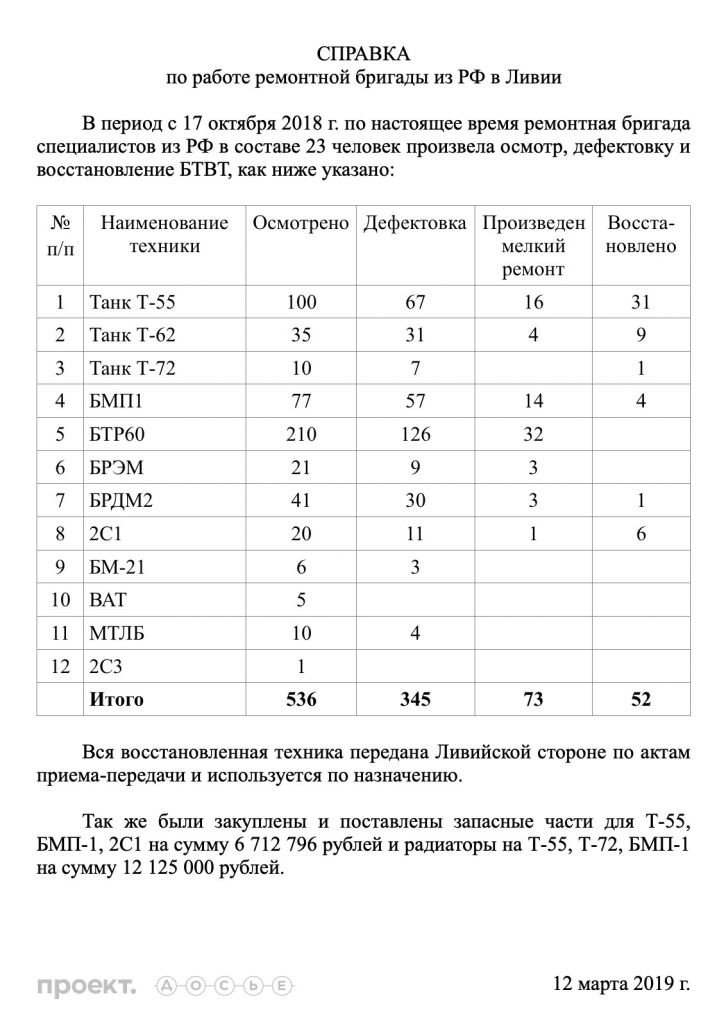
Report on repaired military equipment
In two documents, there is mention of the presence in Libya of 23 repair technicians. The correspondence also contains information as to the amounts of restored military equipment ceded to Haftar by the Russians (see illustration). It transpires from the correspondence that new key parts and components are being supplied from Russia for repairs. From 17 October 2018 onwards, Russia procured spare parts for a sum of 18.8 million roubles. In the meta-data of the documents, there is an indication that their author is Valery Chekalov, who, according to media publications, is connected to the so-called Wagner Group, the group of Russian mercenaries sponsored by Prigozhin.
New Russian weaponry is also being supplied to Haftar, if we believe the correspondence of the “Prigozhin contingent” – “Every day there are three IL-76 planes/flights delivering Russian weaponry from the UAE via Jordan”, it says in one of the documents. Traces of this “airlift” were discovered on 26 July 2019, when two IL-76 military-transport planes, capable of bringing Haftar’s troops weapons, were hit by enemy fire. The incident occurred on territory under Haftar’s control. Additionally, the very fact of the shootdown and destruction of the planes were confirmed by the aviation authorities of Ukraine, where the planes were registered.
It is possible to establish from the registration numbers that the planes were operated by the Ukrainian company Europe Air. This was one of the companies that could have been used for the transit of Russian shipments to the Middle East and North Africa.

Burnt IL-76 aircrafts
Source: bmpd.livejournal.com
The chairman of Europe Air up until August 2016 was Jaideep Mirchandani, according to the Ukrainian database of legal entities. He is also the well-known founder and executive director of the SkyOne company, which has its offices in UAE. Mirchandani was born in India, studied engineering in Baku and speaks fluent English and Russian, as stated on the SkyOne site. Mirchandani had an aviation business in Britain and Russia, according to the registers of legal entities in both countries.
In 2014, the US government included Mirchandani and the members of his family, as well as several companies belonging to him, on the list of persons acting against the national interests of USA. Washington asserted that Mircahndani’s family was involved in activities supporting the Syrian regime, and the companies linked to Mirchandani were delivering “large amounts of Russian currency to the government of Syria.” In 2016, the Mirchandanis were removed from this list after an appeal was lodged.
The documents we have studied allow us to draw the conclusion that the activity of “Prigozhin’s men” in Libya has, at the very least, the approval of the military and political leadership of Russia. A number of reports on the politico-military situation in the country are addressed to the senior leadership of the Ministry of Defence or personally to Sergei Shoigu, Russian Minister of Defence. Another series of documents are dedicated to a plan to organise a major international conference in Sochi – the location of Vladimir Putin’s favourite residence, where he frequently hosts important international meetings. Over many years, Prigozhin had also accompanied the president there; a few years ago, he was not above serving the president personally at the residence, Bocharov Ruchey, a source says, who was at the residence and saw Prigozhin there. As a high-ranking Russian politician once told “Proyekt,” Prigozhin “of course agrees” with his own foreign policy activities with Putin (read about Prigozhin’s actions in other countries of Africa too in the documentation of the project: Parts 1 and 3).
In their everyday work in Libya, Prigozhin’s delegates also cooperate with servicemen: in the documents, there are numerous reports of contacts with military experts of the Ministry of Defence – for example, in one case a military expert assessed Haftar’s troops’ chances of taking Tripoli, and in another, the Russian military command asks Haftar for a plan of his combat operations.
The Return of Gaddafi
— The world situation is complicated, Dima. We could even lose the country.
— But why, why should I lose it?
— Because as I said, the world situation is very complicated, Dima. Gaddafi also thought that he wouldn’t lose it – But it turned out that the Americans were craftier.
As the writer Mikhail Zygar says, an exchange more or less similar to the one above could have taken place in 2011 between the then-PM Putin and President Dmitri Medvedev on a fishing trip near Astrakhan – the dialogue is quoted in his book “All the Kremlin’s Men”. In exactly the same manner, Putin forced Medvedev to give up the presidency and offer him the opportunity of standing for a third term as president, says Zygar.
It is impossible to vouch for the accuracy of the conversation, but we know for sure that Putin was very concerned indeed by the fate of the now-deceased leader of the Libyan Jamahiriya and that it played an important part in his decision to return to the Kremlin. Gaddafi was deposed in the course of the Arab Spring of 2011 and murdered by a mob when trying to flee from Tripoli. The first time Putin and Medvedev publicly clashed was because of Libya, when the international coalition intervened in the civil war on the side of Gaddafi’s enemies. Medvedev thought the UN resolution on Libya was right, and Moscow had not used its veto. On learning this, PM Putin criticised the position of Russia, prompting Medvedev to react harshly. In the wake of this squabble the security officials in Putin’s entourage advised him to return to power, writes Zygar; this had also been confirmed previously by people interviewed by “Proyekt” in the circles of both leaders. Putin personally watched the sadly famous video of the execution of Gaddafi by the armed mob and was incensed by what he saw and by “Medvedev’s weakness,” said a federal politician who had been contact with the President and the PM.
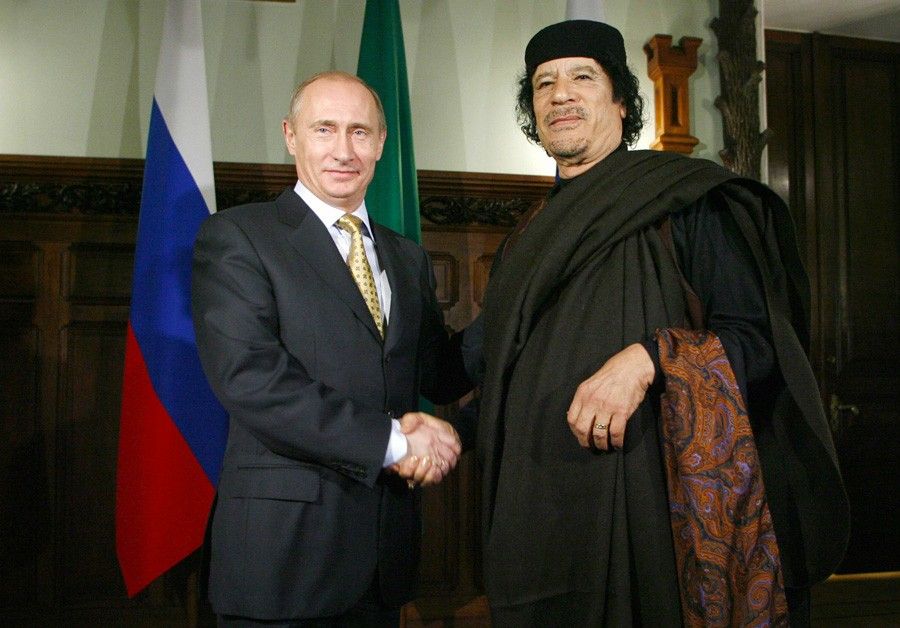
The meeting of Vladimir Putin and Muammar Gaddafi in Moscow, 2008.
Source: premier.gov.ru
Now, some eight years later, Russia has decided to build new relations with Gaddafi – with the son, that is, of the murdered Libyan leader, Saif al-Islam, who has ambitions to return his family to power in the country, as evidenced from the correspondence between Russians working in Libya.
A number of documents that the editors have seen show that up until the end of 2018 Russia saw its best bet in Haftar: he came to meetings in Moscow, visited a Russian warship in the Mediterranean and is in constant contact with Shoigu’s ministry.
However, over the last months or so the envoys of Prigozhin working alongside Haftar have criticised him, reporting back to the centre that the field-marshal is too arrogant, not up to assessing the situation, and saying that he doesn’t have the resources needed to take Tripoli and concluding that he is unlikely to be a long-term partner “in the light of his ongoing illness from cancer” – But the main complaint against Haftar is that he has no intention of giving up his American citizenship; his family lives in the United States and the marshal himself is in negotiations with European and Arab countries, while at the same time accepting Russian assistance. “There are solid grounds for supposing that if he had a politico-military success, Haftar would not remain loyal to Russian interests,” one of Prigozhin’s political strategists summed it up in a document headed “For the Ministry of Defence.” “So as to neutralise the risks, we propose to strengthen the positions of the western part of the country by uniting all forces under Saif Gaddafi,” the author of the report states.
Contacts with Saif began at the end of 2018 and beginning of 2019, it would appear from a number of documents that the editors have learnt of – Prigozhin’s delegates have on at least one occasion met Gaddafi personally and also have had telephone conversations with him. The meeting took place in Zintan, a town in western Libya, at the beginning of 2019. There are indications in one of the documents that the meeting-place was kept secret. This is to do with the fact that Saif, who is rumoured to have served time in a Libyan jail, still faces international criminal charges against him – he is wanted by the International Criminal Court in The Hague for crimes committed during his father’s rule.
The report of the Russian delegation on the meeting with Saif on April 3rd is particularly noteworthy: the author describes the circumstances of the conversation – Gaddafi was continually distracted by the TV relaying news about Haftar – and then concludes with recommendations as to the way ahead. They propose that Prigozhin’s men take a compromising video of Haftar and post it on social media.
Prigozhin’s men, on their own admission, had by March 2019 set up in Libya 12 Arab-speaking groups on Facebook – partly in the interests of Gaddafi, partly in those of Haftar.

One of the versions of the logos for Gaddafi’s party designed by Russians
The IT tech reports that their permanent public audience is more than 250,000, and the weekly hits total more than 2,000,000 users.
In another document the couriers of Prigozhin report that they have provided financial support to the “Jamahiriya TV” television channel which broadcasts from Cairo on behalf of Gaddafi junior; the document talks of financial assistance, but also says that the Russians advise Libyan journalists on content issues. To demonstrate the effectiveness of their work, Prigozhin’s men even show two images of a Jamahiriya TV live studio – before and after Russian money.

Transformation of a live studio, according to the documents of “Prigozhin’s men”
In general terms, Prigozhin’s envoys drew up for Saif a set of recommendations. Amongst other things, Prigozhin’s associates included recommendations such as having Russian forces setting up a party with the provisional title of “Libya Resurgent,” the discrediting of Gaddafi’s enemies and organising international protests and flashmobs in his support.
Relations between “Prigozhin’s men” and Gaddafi are almost certainly coordinated by the government in Moscow: in the beginning of 2018, exactly at the same time as Prigozhin’s associates began to show interest in him, two of Saif’s representatives met in Moscow with the Deputy Foreign Minister, Mikhail Bogdanov. According to reports of the official Russian media, they conveyed to Putin their request that he support the political ambitions of Gaddafi and his plan to get Libya out of its crisis.
Divide and Rule
In November 2018, Prigozhin’s political strategists carried out street and telephone surveys in Libya. According to them, Saif would beat all his rivals in the event of an election, including Haftar and the head of the central government in Tripoli, Fayez al-Serraj (supported by the majority of the international community).
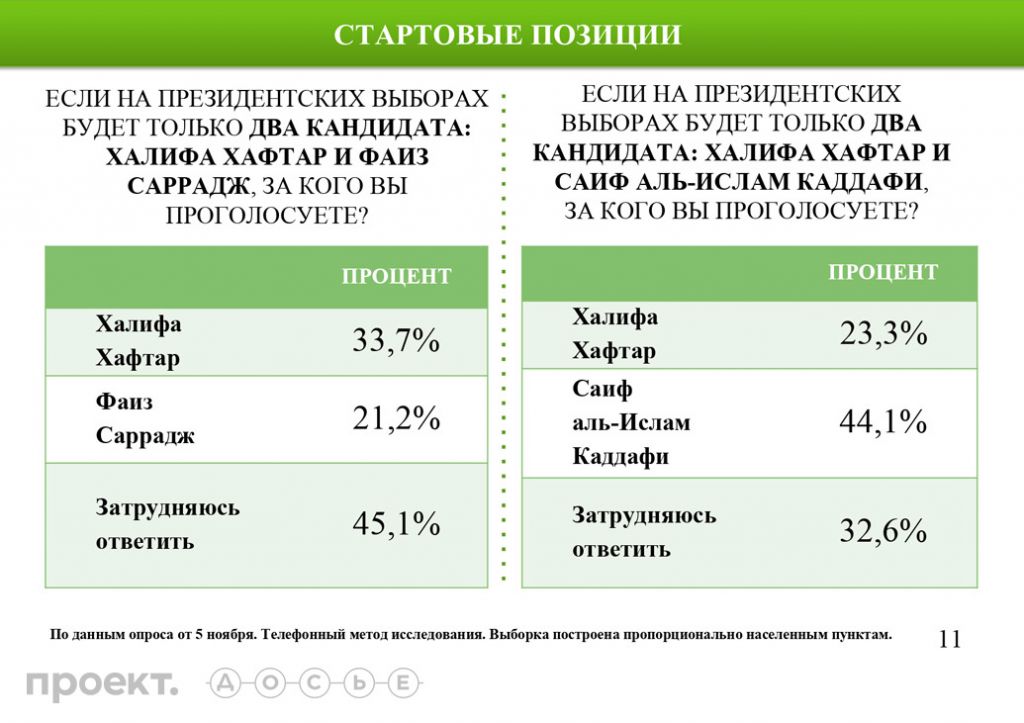
Voter turnout of Libyan politicians
STARTING POSITIONS
Q: If there were only two candidates at a presidential election, who would you vote for – Khalifa Haftar or Fayez al-Serraj?
Result: Haftar: 37%; al-Sarraj: 21.2%; Don’t know: 45.1%
Q: If there were only two candidates at a presidential election, who would you vote for – Khalifa Haftar or Saif al-Islam Gaddafi?
Result: Haftar: 23.3%; Gaddafi: 44.1%; Don’t know: 32.6%
Results of survey of November 5. Research by telephone. The selection is based proportionally on population centres.
However, not wanting to limit itself to just two potential candidates, Moscow is also in contact with other warlords in Libya – one of the documents says that the only influential player who refused to contact the envoys was Fayez al-Serraj, who fears that relations with Russia will spoil his image in the west; he occasionally plans protests against Haftar and Gaddafi behind their backs.
In one of the documents, it says openly that Russia has had talks with Sudan about invading Libyan territory and attacking Haftar’s forces. “Agreements have been reached with the leader of the Rapid Reaction Forces of Sudan, Mohamed Hamdan Dagolo “Hemeti” with regard to possible joint actions in Libya. Sudan’s interest here would be in routing the mercenary group from the Sudanese opposition fighting on Haftar’s side. Hemeti’s forces, in conjunction with the Tubu (a numerous tribe in the south of Libya), would neutralise the politico-military success of Haftar in the south of Libya, thus forcing him to the negotiating table,” it states in a document entitled “Note for the Ministry of Defence.” Prigozhin’s men’s activity in Sudan has been known about long since. There was at the very least one Russian working for Prigozhin in Sudan who was subsequently seconded to Libya (see below). “Hemeti” Dagolo, who is mentioned in the document, is an influential warlord in Sudan whom the Air Force call “the most powerful man” in the country. He is also considered to be responsible for acts of genocide in the province of Darfur and his name is linked to the recent crackdown on demonstrators in the Sudanese capital, Khartoum.
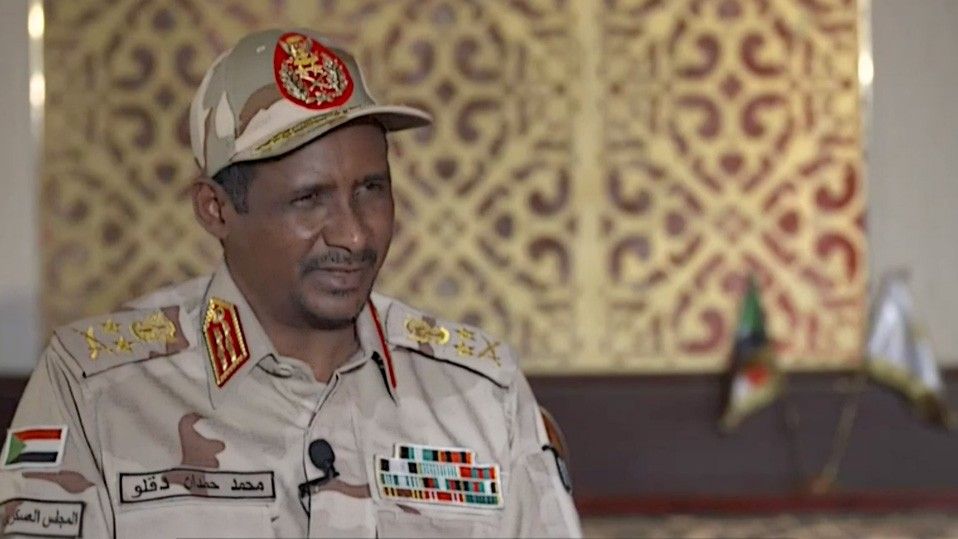
Mohamed Hamdan Dagolo “Hemeti”, Sudanese warlord
Source: bbc.com
On the other hand, the Russians are not very happy with the “narcissistic” behaviour of Gaddafi and are wondering about his future. As a result of his possibly not cooperating with Haftar, Gaddafi may be “arrested and tried in The Hague”, Russian political strategists write.
Their level
Once a political strategist sent out by Prigozhin’s company to the Central African Republic was called on his mobile by the “Kremlin Cook” himself. As “Proyekt” reported earlier, each member on mission in Africa has his own telephone for direct calls with Prigozhin. The latter, as political consultants themselves have told us, occasionally phones to personally check up on their work. When he took the call, the Russian was so drunk that he couldn’t answer Prigozhin’s important questions – for which he was instantaneously dismissed. This tale, paraphrased from the words of two sources unknown to each other, shows not only the degree of involvement in foreign policy of Prigozhin himself, but also the level of professionalism of many Russian consultants. Proyekt has already reported on the background of some of Prigozhin’s political consultants in Africa.
“— One of them worked for me in a regional company. He was doing placards. And that was his level – ” said the Russian political consultant familiar with the members of Prigozhin’s team.
Amongst the documents in the “Libyan file” there are some recommendations which look decidedly odd. They contain ideas calqued from Russian circumstances about setting up a civic chamber, an institute of representatives and even a civil national front to support the president. To see these plans through the media the technologists propose that the Libyans create four new newspapers, two of which will be comics and will have a print-run of 20,000.
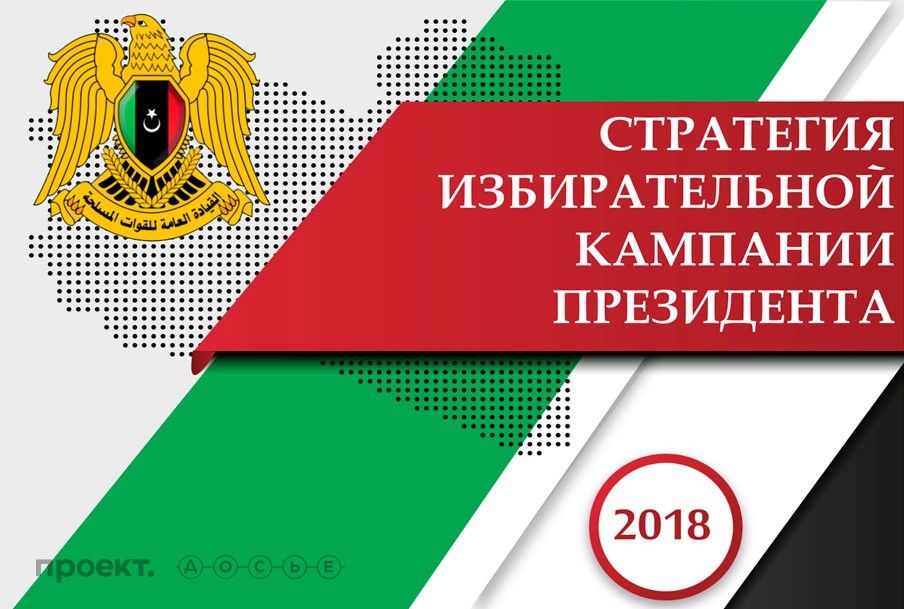
Cover of the brochure designed by Prigozhin’s political strategists: ‘Strategy of the President’s Electoral Campaign’
A number of different groups of “Prigozhin’s men” have worked in Libya, either at the same time or concurrently – and only one of the groups was arrested. The missions started from October of last year – the date of the first “mission” was given by a source from amongst the staffers and they confirm at the Fund for National Research that the project started in the beginning of 2019. Amongst those taking part in the “Libyan project” was a staffer in the “back-office”, a Russian of Syrian descent called Yunes Abazid (judging by social media, he had previously contributed to Russia Today Arabic). Before coming to Libya, he had worked in Sudan with Mikhail Potemkin, a regional representative affiliated with Prigozhin’s company “Minvest,” which was prospecting in Sudan for gold, we were informed by a source in Prigozhin’s outfit. Abazid did not respond to the editors’ request for further information.
Another man working for the Russians in Libya was Abdulmajid Eshul. Prokofiev calls him “one of the consultants”. He is the leader of “Mandela Libya”, or that’s how he was introduced by Aleksandr Malkevich. This is an organisation that deals with supporting the presidential ambitions of Saif Gaddafi, and compares the latter with Nelson Mandela. There is a newspaper in Libya that is published under the same name: “Mandela Libya”- and its Facebook page has been active since December. In particular, “Mandela Libya” published a poll querying members of the public if they would pledge their support to Gaddafi in a presidential run. The page reports that 62,000 people answered “yes”. This was noticed by the German fund Democracy Reporting International, which concluded that the majority of respondents were fake.
After the arrest
Aleksandr Prokofiev, a colleague of the arrested men, described to us how, the day after the Russians were arrested, the Libyan who had helped them with day-to-day matters came to check their house. The Libyan said that the house had been plundered: everything had been taken away, including even the furniture, and the personal effects of the Russians had also disappeared – their laptops, documents and money. The car they had hired was also gone. The Libyan called Prokofiev to inform him that his colleagues had, in all likelihood, been abducted. With the help of the neighbours who had witnessed the arrest, they found out that on the jeeps there were stickers of one of the armed factions operating from the town of Misurat. It took more than a week to ascertain that the Russians were in fact in prison.
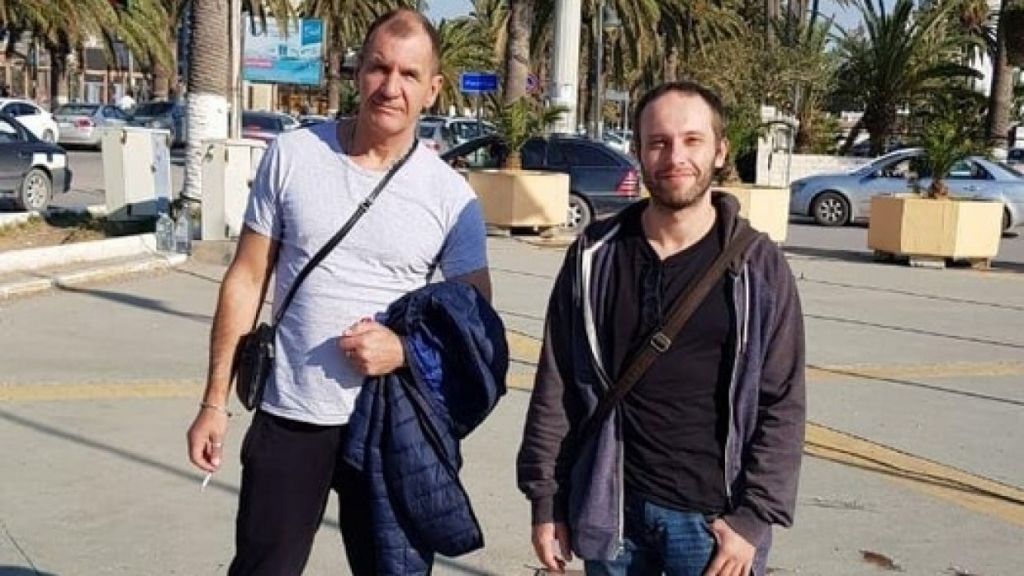
Maxim Shugaley and Aleksandr Prokofiev
Source: VK
Eshul and another “consultant,” Mohamed Treki, it was rumoured, had also been put in prison, Prigozhin’s men said. Eshul’s son, Azil, was put behind bars, but was soon released, said Malkevich, so that he would tell the rest what would happen to each one of them if they collaborated with the Russians; this was also confirmed by the lawyer that Treki’s wife had hired. At least two other Libyans who had been neighbours of the Russians were also supposed to be in jail: the head of a family and one of his household members – so said “Prigozhin’s men”. Other people who had been working with the Russians in Libya also stopped calling them; “we don’t know for sure whether they’ve been arrested or if they’re in hiding”, said Prokofiev.
Mohamed Treki, the son of the former Minister of Foreign Affairs of Libya and Chairman of the UN General Assembly, who had fled to Egypt, consulted with the Russians while they were working in Libya. After Shugaley’s and Sueyfan’s arrest, it was Treki who had led the talks on behalf of their employer and it is supposed that he may have met with the head of the Government of National Accord, al-Sarraj, says Prokofiev. Prigozhin’s associates refuse to reveal the details of the negotiations for their release, explaining that it could harm the process. Publicly at the “Fund for the Protection of National Values” they insist that Libya had demanded from Russia “deliberately unfulfillable conditions;” requests such as “send to Libya a large consignment of arms and convey to the senior officials of the Russian MFA ‘taskings’ with regard to relations with Tripoli on behalf of the leaders of the militants.”
Shugaley shortly before his mission suffered a stroke and came to Libya with a large packet of medication, said someone who worked closely with him – he still has family in Russia. Samer Sueyfan is diabetic. As they said at Prigozhin’s HQ, they are still not allowing him to see a Libyan lawyer.
During the entire period of their detention, the government in Moscow has not made any statement demanding the release of Russian citizens. That said, there have been many attempts at an unofficial level to achieve this end and Deputy Foreign Minister Mikhail Bogdanov has been tasked with this mission, we are told by an interlocutor from “Prigozhin’s men” as well as a source near to the Libyan government. Malkevich speaks of violations of human rights having already been recorded in the prison where the political strategists are being held and the Russians there may have been tortured, he said. In “Mitiga” prison, “it is supposed there are some 2,600 men, women and children who are subjected to torture, refused medical assistance and who are dying in custody”, wrote Foreign Policy in April of this year. Last year’s UN report also spoke of torture and unlawful killings in the same prison. At the beginning of this year an enquiry into violations of human rights in “Mitiga” was initiated by the International Criminal Court.
The press-secretary of the President, Dmitri Peskov, and the Ministry of Foreign Affairs representative, Maria Zakharova, declined to answer questions put by “Proyekt”.
***
Presidential elections in Libya have not yet been called – and will not happen earlier than 2020. Despite the detention of Russians, political and military contacts between Moscow and the various Libyan groups probably continue; it was reported by the French news outlet Maghreb Confidential that Khalifa Haftar was again in Moscow at the end of August.
Two earlier pieces of Proyekt’s series are published in English:







